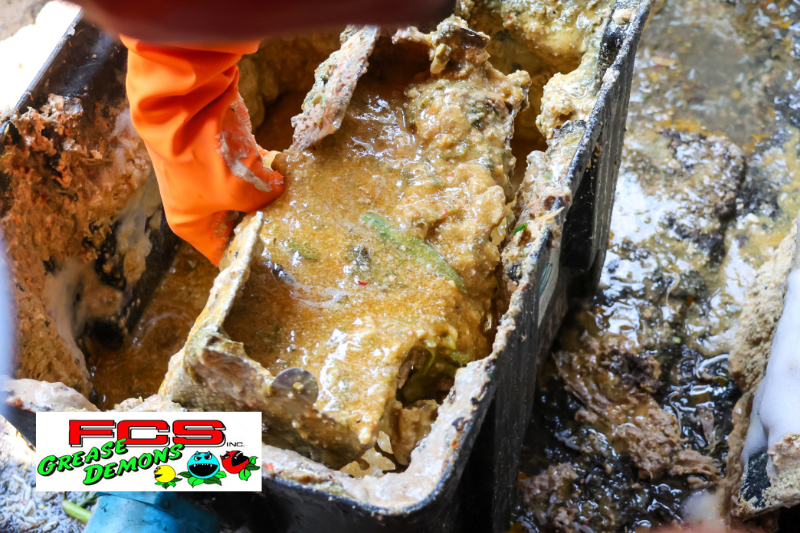How Do You Remove the Smell From a Grease Trap?
Running a restaurant or any food service business comes with many responsibilities, and one of the often-overlooked tasks is grease trap maintenance. While grease traps play a vital role in keeping fats, oils, and grease (FOG) from clogging your plumbing system, they can also become a source of unpleasant odors if not properly maintained. Grease trap odors can negatively impact your business, creating an uncomfortable environment for your employees and customers. In this blog post, we’ll explore the causes of grease trap smells, how to remove them, and best practices for preventing odors in the future.
Understanding the Cause of Grease Trap Smells
Before tackling the problem of grease trap smells, it’s essential to understand what causes these odors. Grease traps are designed to capture FOG from wastewater before it enters your plumbing system. However, over time, grease, food particles, and other organic matter can accumulate inside the trap. As this waste breaks down, it produces foul-smelling gases, such as hydrogen sulfide, which can seep out of the grease trap and into your restaurant or business.
Some common reasons for grease trap smells include:
- Buildup of Grease and Food Waste: If grease traps are not cleaned regularly, grease and food particles can build up inside the trap, leading to decomposition and the release of foul odors.
- Clogs and Blockages: When the flow of wastewater through the grease trap is obstructed by a clog, it can cause water to stagnate, which contributes to the growth of bacteria and the production of foul smells.
- Damaged or Worn Seals: The seals around the grease trap’s lid are designed to prevent odors from escaping. However, if these seals become damaged or worn out over time, they may allow odors to leak out into the kitchen or dining area.
- Ventilation Issues: Grease traps rely on proper ventilation to allow gases to escape safely. If the ventilation system is blocked or malfunctioning, it can cause odors to build up and enter your business.
Understanding these common causes of grease trap smells can help you identify the source of the problem and take the appropriate steps to address it.
Steps to Remove Grease Trap Smells
Removing grease trap smells requires a combination of cleaning, maintenance, and preventive measures. Here’s a step-by-step guide to help you get rid of those unpleasant odors and keep your business smelling fresh:
- Schedule Regular Grease Trap Cleaning
The most effective way to eliminate grease trap odors is to schedule regular grease trap cleaning. Over time, grease, food particles, and other debris accumulate inside the trap, leading to unpleasant smells. Regular cleaning ensures that your grease trap remains free of buildup and functions properly.
Depending on the size of your grease trap, the volume of business, and the type of food you prepare, you may need to clean your grease trap every one to three months. High-volume restaurants may require more frequent cleaning to prevent odors from developing.
Hiring a professional grease trap cleaning service is the best way to ensure that the job is done thoroughly. A professional service will remove all the grease and waste from the trap, clean the interior, and inspect the trap for any signs of damage or wear.
- Inspect and Replace Seals
The seals around the grease trap’s lid play a crucial role in preventing odors from escaping. Over time, these seals can become worn, damaged, or loose, allowing foul smells to leak out. If you notice grease trap odors in your kitchen or dining area, inspect the seals for signs of wear and replace them if necessary.
A professional grease trap cleaning service can also inspect the seals during routine maintenance and recommend replacements if needed. Keeping the seals in good condition will help prevent odors from escaping and ensure that your grease trap functions properly.
- Check for Clogs and Blockages
Clogs and blockages in the grease trap or the surrounding plumbing can cause wastewater to stagnate, leading to foul smells. If you notice slow drainage or backups in your sinks or drains, it could be a sign of a clog in the grease trap.
To remove clogs and prevent odors, schedule a professional inspection and cleaning of your grease trap and plumbing system. A professional service can identify and remove blockages, ensuring that wastewater flows smoothly and odors are kept at bay.
- Ensure Proper Ventilation
Grease traps are equipped with ventilation systems that allow gases to escape safely. If the ventilation system is blocked or malfunctioning, it can cause odors to build up and enter your business. Make sure that the ventilation system is functioning correctly and that there are no obstructions that could prevent gases from escaping.
If you’re unsure about the condition of your grease trap’s ventilation system, consult a professional grease trap cleaning service. They can inspect the system and make any necessary repairs to ensure that it’s working properly.
- Use Enzyme Cleaners
Enzyme cleaners are specially formulated products that break down grease and organic matter in grease traps, helping to reduce odors. These cleaners contain natural enzymes that digest FOG, preventing the buildup of waste and the production of foul smells.
While enzyme cleaners can be a helpful tool in maintaining your grease trap, they should not be used as a substitute for regular professional cleaning. Enzyme cleaners work best when used in conjunction with routine maintenance to keep your grease trap in optimal condition.
- Maintain a Regular Cleaning Schedule
In addition to professional grease trap cleaning, it’s important to maintain a regular cleaning schedule for your kitchen. Grease and food particles can accumulate on surfaces, in drains, and in the grease trap itself, contributing to unpleasant odors.
Encourage your staff to clean up grease spills immediately, scrape food waste into the trash before washing dishes, and avoid pouring oils and fats down the drain. Regular cleaning and proper grease disposal practices can help prevent odors from developing and keep your kitchen smelling fresh.
The Importance of Preventive Maintenance
Preventing grease trap smells is all about regular maintenance and attention to detail. By scheduling routine grease trap cleaning and inspections, replacing worn seals, and ensuring proper ventilation, you can keep unpleasant odors at bay and maintain a clean, comfortable environment for your employees and customers.
Neglecting grease trap maintenance can lead to more than just unpleasant smells. It can also result in clogs, backups, and costly repairs that disrupt your business operations. By staying proactive and addressing potential issues before they become major problems, you can protect your business from downtime and ensure that your grease trap continues to function effectively.
Contact FCS, Inc For Grease Trap Cleaning
Grease trap smells can be a major nuisance for restaurants and food service businesses, but with the right approach, they can be effectively managed and prevented. Regular grease trap cleaning, inspections, and maintenance are key to keeping odors at bay and ensuring that your business remains a pleasant and sanitary environment.
At FCS, Inc., we specialize in grease trap cleaning and maintenance services for businesses of all sizes. Our team of experienced professionals is here to help you keep your grease trap in top condition, ensuring that your kitchen stays odor-free and your plumbing system runs smoothly.

